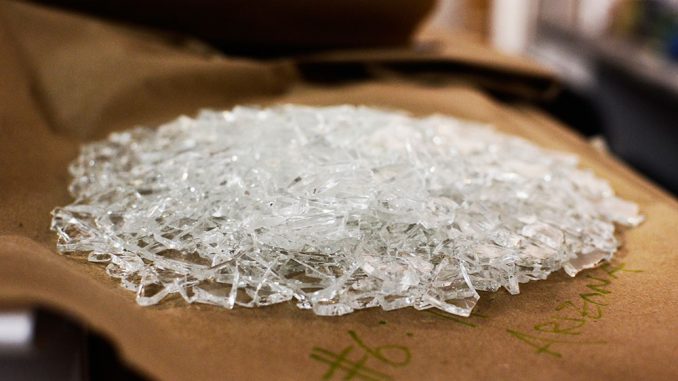
Morgan Gilbreath spends the majority of the walk from her home to Main Campus looking down, but not out of shyness – she’s looking at the sidewalk from an artist’s perspective.

The senior, who is double-majoring in glass and art history and receiving a certification in community arts practices, said she is fascinated by her community, especially the way in which public and private space meets at the sidewalk. This was the inspiration behind some of her artwork, and also the focus of an article she wrote for a recent issue of Cleaver Magazine.
Gilbreath was first approached by her friend in the glass department, fellow student Madeline Rile-Smith, to write about her work for Cleaver Magazine. Smith’s mother, a creative writing professor at the University of Pennsylvania, founded the magazine, which chooses three artists a month to showcase and write about their work.
Gilbreath said she’s had practice writing, as a lot of her pieces are accompanied by artist statements. She said she felt ready to take on the contribution to Cleaver Magazine
“I really love writing and I’ve done tons of creative writing,” Gilbreath said. “If you were to look at a piece I made, it might not be as significant unless you read about it as well, so I think literature and writing and words are very integral to my art practice.”
Her article, entitled “The Ground Beneath My Feet,” discusses three of her works that were inspired by her walks to campus and the objects she acquired along the way. One of Gilbreath’s pieces was comprised of hundreds of small plastic bags – which she said she assumes are typically used to carry drugs – which she discovered around the city.
She said while they are small and most people would never think twice about them, they represent a larger problem, and that is the kind of message she aims to send through her art.
“Writing about [these pieces] helped me realize for the first time how they related to things like trash and things that people choose to reject,” Gilbreath said. “A lot of people see that as a bad aspect – which I guess it is. At the same time, it’s a huge source of inspiration for me.”
While she said her own work may not be making a tangible difference in the community at this point in her career, Gilbreath makes a point in her article to emphasize the responsibility she believes she and other artists have to better their communities.
“[My work] is sort of raising awareness to things, or hopefully teaching people to find beauty in things or look at things a different way,” Gilbreath said. “I try to focus on little details that have larger implications, to make a larger comment on society through a smaller lens.”
By bringing objects that represent negative aspects of the city into an artistic light, Gilbreath said people are able to better understand their significance and accept their presence in a community.
“It’s really important for art to show the value that things have in everyday life,” Gilbreath said. “Some people look at art like it’s a painting on the wall and it’s for the wealthy, but I want it to be more accessible.”
She said part of the reason she loves working with glass is because it is a universal material that indicates the social environment of an area, depending on how it is used.
“How glass is used by someone is kind of an indicator of class,” she said. “If you’re in a place with broken bottles all over the ground, that’s different than if you’re in a place drinking out of a goblet.”
Gilbreath has put this idea into action, scouring the city for small pieces of glass to use in her work. All of the glass she collects is then cleaned and fired in a kiln to make art using trash.
Although this project and many others she has worked on require time and cooperative effort, Gilbreath said she enjoys taking advantage of all the opportunities that come her way and is making a slight transition from community-oriented work to art that is more labor-intensive.
“The idea of labor is very important to me – art is very hard work, but I love it,” Gilbreath said. “Sometimes I feel a little bit guilty for being able to do what I love, because there are so many people in the world that don’t have the privilege to pursue what they love. All my work is about society, but a lot of it is about labor now, too, and not just the city around me.”
Alexa Bricker can be reached at abricke1@temple.edu.



Be the first to comment